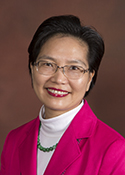A Niche Practice of “Family Office” by Elizabeth Campana
Elizabeth Campana’s career paths demonstrate how the financial industry is a flexible field with various areas within it to work in. Her career story also shows how there are multiple ways to transition within the industry including into her current field of work- single-family office.
After graduating from the University of Buffalo with a Bachelor of Science in Accounting and Finance, Campana started her career at AXA Advisors as a Financial Consultant. Her role was to work in sales and work with individuals on their plans such as insurance and retirement. This coincided with the 2008 recession which proved to be an interesting time to begin working.
She then moved to Boston to earn her MBA in business administration, finance, and financial management services at the University of Massachusetts Amherst. While living in Boston she got another job as the assistant to a partner portfolio manager at Wellington Management before becoming a research associate. A few years later she moved on to a role in a single-family office. Since then in the last four years, she has had two positions as the Relationship Manager and is now the Director of Financial Planning.
If you are like me, then you may not know what a family office is where Campana works. Investopedia describes it as, “private wealth management advisory firms that serve ultra-high-net-worth (UHNW) investors such as J.F Kennedy or Vanderbelt. They are different from traditional wealth management shops in that they offer a total outsourced solution to managing the financial and investment side of an affluent individual or family. For example, many family offices offer budgeting, insurance, charitable giving, family-owned businesses, wealth transfer, and tax services.” Campana describes it as looking after a wealthy family’s finances providing service, needs, advice, trusts, and looking after the wealth from generation to generation.
The family that Campana works for has five generations and various relationships within it. The original wealth of the family started back in the 1800s. “It’s really interesting, every day is different… You help provide a process and a good framework for governance,” Campana said, describing her role. Within the office she is often their problem solver when an issue or question occurs.
As you may imagine, there are various characters within the family that can be interesting to interact with but also in terms of how to work effectively with each person. The role of the office is to provide customized solutions, which is different from how a bank may handle the situation. There is a strong personalized aspect to the business from working with individuals to providing advice.
So what separates a family office from a large private client group? Campana said that each family office depends on the clients and family connectivity. But there are benefits of working with a family office such as maintaining confidentiality about the details of the wealth.
One of the most important parts of the family office is maintaining relationships with individuals in the family, but also between the individuals. It’s important to have conversations, communication, and connections Campana said, “If you don’t have connectivity it’s really hard to pass wealth from one generation to the next.” She defined connectivity as having shared values and good governance.
Campana believes that anyone can work on their financial health and wellness. “It doesn’t matter if you are very wealthy or on the other end of the spectrum, it’s [financial planning] key to your financial wellness. That can mean different things to different people.” Campana says that communication and being comfortable talking about finances is key. She also says it’s good to know and understand your own relationship to money, have good goals and values, and good habits in order to have good financial wellness and planning.
As a successful planner Campana tries to pay back to her community. She has a mentoring group with her alma mater, University of Buffalo, to help women in finance. She networks with others and works with a scholarship for high school students in STEM. Her advice to Next Gen financial planning professionals is to “Keep an open mind. Network. Don’t be afraid to put yourself out there.” Don’t feel intimidated, not worry about having a goal when you network with others. It’s just important to reach out and talk to others, taking opportunities as they come your way.
If you would like to learn more about careers in finance and being a Financial Planner, reach out to the Financial Planning program here at California Lutheran University. Please visit http://bit.ly/clumbafp.
Elizabeth Campana (Liz) is the Director of Financial Planning at CABOT-Wellington LLC, a single-family office serving five generations of the Cabot family. Campana delivers financial planning and customized investment advice to a diverse group of clients, including ultra-high net worth individuals. She facilitates coordination among estate attorneys, CPAs, and other industry professionals as they are relevant to the client’s financial situation. Campana is a Certified Financial Planner (CFP) and a Chartered Advisor in Philanthropy and she is finalizing her Accredited Estate Planner (AEP) designation. Campana obtained her Bachelor of Science in Accounting and Finance at the University of Buffalo. She also has an MBA in business administration, finance, and financial management services at the University of Massachusetts Amherst. She is a level 2 CFA candidate and volunteers as a subject matter expert at the CFP Board.
Dr. Chia-Li Chien is a succession program director at Value Growth Institute, a succession consulting practice dedicated to helping business owners increase the equity value of their firms. Before her private consulting practice, she held several senior management positions in Fortune 500 companies. Dr. Chien is a director of the financial planning program in the School of Management at California Lutheran University. Dr. Chien is a frequent speaker about succession and retirement planning at national conferences and has published three books, including her most recent publication, “Enhancing Retirement Success Rates in the United States.” Dr. Chien serves on the boards of various national financial service associations. She holds a doctorate in financial planning and is a Certified Financial Planner (CFP®) as well as Project Management Professional (PMP®).
Rosie Baker is an undergraduate student at California Lutheran University expecting to graduate in May 2021. She is studying Communication with an emphasis in PR and Advertising and has a minor in Creative Writing. She is currently writing a book, Windows and Mirrors, which is due to be published this summer with New Degree Press.



